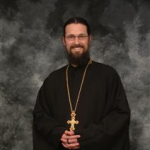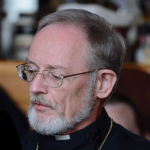Deprecated: trim(): Passing null to parameter #1 ($string) of type string is deprecated in
/home/aoiusa/public_html/wp-content/plugins/sexybookmarks/public.php on line
388
Deprecated: trim(): Passing null to parameter #1 ($string) of type string is deprecated in
/home/aoiusa/public_html/wp-content/plugins/sexybookmarks/public.php on line
394
Deprecated: trim(): Passing null to parameter #1 ($string) of type string is deprecated in
/home/aoiusa/public_html/wp-content/plugins/sexybookmarks/public.php on line
400

It happens a lot. I see something I have never seen before and then an essay or book crosses my path that helps flesh out the idea. Last week I was embroiled in a debate about natural marriage (see Monomakhos). (I’ve quit using the term “traditional marriage” since it implies that such a thing as “non-traditional marriage” actually exists.) My argument began with the assertion that natural marriage is found in nature: It takes one man and one woman to create a child. It would end with the assertion that much homosexualist ideology functions as a new gnosticism.
Critics took me to task for the definition but any clear eyed and sober reflection on nature proves it true. No other relationship, no other union, creates a child and thus a family. Homosexual couplings are by nature sterile. A man-man or woman-woman sexual coupling cannot create a child. In fact, even if one partner donates the sperm or egg, the child that is created can never have the genetic makeup of both partners.
That one man and one woman create a child and thus constitute a natural family is indisputable. Nevertheless some people dispute it, or at least try to diminish the natural reality to define non-natural couplings as somehow natural. The focus of my discussion was on the Church since I think the debate is largely lost in the culture and only when the detritus of these new arrangements become evident will sober thinking begin anew. In particular I discussed the Dunn Error and what I now term Aridian Gnosticism.
David Dunn is a self-styled “Orthodox theologian” who argues that because marriage in the Church takes on a sacramental character, Orthodox Christians should have no problem supporting homosexual couplings as a legal marriage. In doing so, he splits the natural from the sacramental to conclude the natural lies in the realm of the State and the sacramental in the realm of the Church.
He reasons poorly and the argument is easily refuted. A sacrament, properly understood, elevates the natural without diminishing the natural or divorcing itself from it. There is no bifurcation between the natural and sacramental in Orthodox theology. The move to legally sanction homosexual couplings is of great concern to Orthodox Christians and all culturally minded Christians, as it should be.
Fr. Robert Arida, a leading voice among the Orthodox Episcopalians, is more subtle and more dangerous. His writing is turgid and his references oblique (critics call it “studied ambiguity“) but there is no doubting his purpose. Rather than bifurcate the natural from the sacramental in the way that Dunn does, Arida seeks to retool the tradition to embrace the unnatural by appeals to virtue that carry the ring of moral authority because they use the language of the tradition. Yet, in the end, the attempt to naturalize the unnatural remains the same although Arida also tries to sacramentalize it.
For this reason I termed Arida’s approach “Aridian Gnosticism.” Arida takes the language of the moral tradition and privatizes it; imposing his private idea of the good as a universal good on the Church. Robert Riley defines this kind of New Gnosticism below:
Gnosticism does not accept the evidence of reality. It is not a matter of what Gnostics do not know, but of what they refuse to acknowledge. Composer Igor Stravinsky wrote that “the old original sin was one of knowledge, the new original sin is one of non-acknowledgment.” It is the refusal to acknowledge anything outside the operation of the human will—most especially “the good” toward which the soul is ordered. The Gnostic is not interested in conforming his mind to reality but in conforming reality to his wishes. Joseph Pieper defined self-deception as an unobjective perception of reality dictated by the will. It is the sheer willfulness of the homosexual movement that is notable. What are its consequences? Charles DeKonick said: “By a disordered love of one’s private good one rejects…the common good as something alien and judges it to be incompatible with one’s individual status…one freely abdicates the dignity proper to the rational creature in order to establish oneself as a radically independent whole.”iii The common good is the casualty.
The essay below is good although I still have to understand the implications fully. Homosexualism as a New Gnosticism rings more true every day.
Source: The Catholic World Report
The New Gnosticism of the Homosexual Movement
Success for the homosexual dream requires the obliteration of the real and the removal of those who insist on the existence of reality.
Ideas that are not true are dangerous to our souls and to our polities, whether we like it or not.” — Rev. James V. Schall, SJ
If Eric Voegelin (1901-85) were alive today, I think that he would see the homosexual movement as a form of Gnosticism—a spiritually pathological, magical reconstruction of reality, or of a “second reality.” Voegelin wrote that, “All gnostic movements are involved in the project of abolishing the constitution of being, with its origin in divine, transcendent being…”i Does this seem too extreme a charge to bring against the homosexual movement? As I will attempt to show, this is not about some sexual peccadillo that we can wink at and push off into a corner—it is a lie about humanity itself. Lesbian advocate Paula Ettelbrick proclaimed that, “transforming the very fabric of society… [and] radically reordering society’s view of reality” is the goal of the homosexual movement. This is typical Gnostic rhetoric about constructing a substitute reality.
Voegelin said that, “Gnosticism… has produced something like the counterprinciples to the principles of existence; and, insofar as these principles determine an image of reality for the masses of the faithful, it has created a dream world that itself is a social force of the first importance in motivating attitudes and actions…”ii Such counter principles are active and evident in every aspect of the promotion of the homosexual cause. And we have seen the power of its social force as it moved against the religious freedom protection law in Indiana. As a society we have moved from the point where the rationalization for homosexual misbehavior has been accepted as normative to the point where that rationalization will now be imposed and enforced, legally and by social forces at large, on everyone. If you speak out about this, you most likely will lose your job or your business and, most certainly, your social standing. You may be sued. You will become an embarrassment. These have become new forms of censorship, with a strong dose of self-censorship already at play. “This movement,” libertarian journalist John Stossel said, “has moved from tolerance to totalitarianism.”
Voegelin analyzed the Nazi movement as a form of Gnosticism. I do not think it is a stretch to point to Nazi Germany in 1935 as an analogy to current events and their similarly Gnostic nature. That is when the Nuremberg Laws were passed, stripping Jews of their German citizenship and forbidding marriage between non-Jews and Jews. No doubt, there were still many fine and upstanding people in Germany at the time, including many Catholics, but from then on they had to keep their mouths shut about the Nazi racial superiority teachings because they were state law. I am sure there were many people opposed to the race theory of history who said to themselves, as people do today regarding homosexual “marriage,” ‘well, this is a losing issue. Let’s leave it alone and move on.’ They were probably too frightened to consider what they were moving on to, just as people today avoid thinking about the consequences of the complete denial of reality involved in homosexual “marriage.” Anyone who thinks that we are involved in a denial of reality any less profound than that of 1935 Germany is kidding themselves. Success for the homosexual dream requires the obliteration of the real and the removal of those who insist on the existence of reality.
Gnosticism does not accept the evidence of reality. It is not a matter of what Gnostics do not know, but of what they refuse to acknowledge. Composer Igor Stravinsky wrote that “the old original sin was one of knowledge, the new original sin is one of non-acknowledgment.” It is the refusal to acknowledge anything outside the operation of the human will—most especially “the good” toward which the soul is ordered. The Gnostic is not interested in conforming his mind to reality but in conforming reality to his wishes. Joseph Pieper defined self-deception as an unobjective perception of reality dictated by the will. It is the sheer willfulness of the homosexual movement that is notable. What are its consequences? Charles DeKonick said: “By a disordered love of one’s private good one rejects…the common good as something alien and judges it to be incompatible with one’s individual status…one freely abdicates the dignity proper to the rational creature in order to establish oneself as a radically independent whole.”iii The common good is the casualty.
In saying that the homosexual ideology is an unobjective perception of reality, one should note at the same time that the active homosexual does not intend to perform a purely subjective act. He wants to say and believe that his actions are ordered objectively. This is what requires the reconstitution of reality so that it will conform to his will and transform his subjective acts into ones ordered to objective good. To succeed in this endeavor, the homosexual ideologue relocates the source of good from what is to his will. Only then can he successfully rationalize his moral misbehavior.
This ideological operation is especially evident in the campaign for homosexual marriage. Because the use of the word “marriage” is a misrepresentation of the homosexual relationship which it professes to describe, the meaning of “marriage” must be changed and brought into accord with the homosexual relationship. To do this, homosexuals give marriage a purpose that is not congruent with its ends. The heterosexual couple wants, or has as its purpose, the fulfillment of the unitive and procreative ends of marriage. The homosexual couple does not have this purpose, and could not fulfill it. It has a purpose for marriage that is against its ends. The problem is that acting against the ends of marriage will tend to destroy it. This is the nihilism inherent in the homosexual movement.
Why is this so dangerous? Because the nihilism inherent in the homosexual movement necessarily extends to all of reality. It leaves nothing untouched in its unhinging of nature. Recognition of nature means recognition of constraints. Charles McCoy gives us some idea of what happens when that recognition is withdrawn:
We have noted Aristotle’s observation that human nature… may be said to be in a condition of bondage. This bondage produces in man a tendency to revolt and escape from his condition. But this type of emancipation—from the human condition itself—can lead only to the supremacy of force. Hence, true freedom, the “political” freedom of man’s very nature, is protected by an insistence on the primacy of theoretic (speculative) truth concerning man’s nature and end.iv
McCoy wrote this many years before the arrival of the homosexual movement on the scene, but it applies exactly. The success of the homosexual movement can only be achieved by dethroning the primacy of truth concerning man’s nature and end. By substituting the primacy of will for the primacy of reason, we may be sure that the supremacy of force will follow. Most likely this is what the late Francis Cardinal George had in mind in 2012,when he said, “I expect to die in bed, my successor will die in prison and his successor will die a martyr in the public square.”
What is the standard we should use to measure things regarding man’s nature and end, and how do we discern what is in accord with it or against it? Aristotle states that “in order to find what is natural we must look among those things which according to nature are in a sound condition, not among those that are corrupt.” In the Politics (1.5 .1254a36—39), he says, “Thus the human being to be studied is one whose state is best, both in body and soul—in him this is clear.” Francis Slade remarked that it is “clear because the end realized as form is present in its complete actuality”—meaning it has reached its perfection.
Thus, because we know what a human being is in the fullest, we can understand what a privation is. For example, we can know with certainty that 20/20 vison is the best for the eye and blindness the worst. With 20/20 vison, the eye has reached its complete actuality. It is perfect as an eye. It possesses no potential to see better than it does. In respect to a man’s sexual powers, which are unitive and generative by nature, the one whose state is best would be a man as husband and father, just as for a woman it would be as wife and mother. This is how we know that homosexual inclinations are privations and that homosexual acts are disorders. It is not a matter of “who says.” Homosexual behavior cannot actualize sexual potential because homosexual acts can be neither unitive nor procreative. Like a withered limb, congenital deafness, blindness, or a genetic predisposition to alcoholism, homosexual inclinations are not part of what a human being is in his essence. These are accidental, not essential properties. In each case, there is something missing that out to be there. For instance, the limb ought to be able to move in its full strength, the ear ought to be able to hear, and the eye to see. The further a thing is from its perfection, the more defective or “corrupt” it is—just as blindness is the furthest defect of the eye. A privation of the good cannot itself be good. In fact, as St. Augustine said, evil is a privation of the good.
When Tim Cook, the CEO of Apple, announced, “I’m proud to be gay, and I consider being gay among the greatest gifts God has given me,” he substituted a privation of the good for the good itself. This is a metaphysical travesty. I wonder if an alcoholic, as he ambled into a bar, would say, ‘I’m proud to be an alcoholic and I consider alcoholism among the greatest gifts God has given me.’ Of course, if he is a reformed alcoholic and his struggle has led him to a deep spiritual life, he could consider the privation from which he suffered a kind of good in the same way that Alexander Solzhenitsyn said, “bless you, prison” about his horrible experiences in the Soviet Gulag.
However, I do not think this is what Cook had in mind. His kind of inversion is typical of the homosexual rationalization, and was used by Cook in his subsequent attack on the Indiana religious freedom law. Cook averred that a law protecting religious believers from discrimination for their belief that sodomy cannot morally be the basis of marriage was itself a form of discrimination since it did not conform to the homosexual belief that homosexual acts are morally good. Soon it may be a condition of doing business in the United States that one accepts the moral legitimacy of the views expressed by Tim Cook—that a privation of the good is at least equivalent to the good of which it is a privation. This, of course, is an offense against the principle of non-contradiction, which is why Voegelin describes Gnosticism as insane. Unless blindness is the same as sight, one cannot say that the use of sexual organs in ways unfit for either generation or union is the same as their use for generation and/or union.
Recall that Voegelin said,
In the Gnostic dream world . . . nonrecognition of reality is the first principle. As a consequence, types of action which in the real world would be considered as morally insane because of the real effects which they have will be considered moral in the dream world because they intended an entirely different effect. The gap between intended and real effect will be imputed not to the Gnostic immorality of ignoring the structure of reality but to the immorality of some other person or society that does not behave as it should behave according to the dream conception of cause and effect. The interpretation of moral insanity as morality, and of the virtues of sophia and prudentia as immorality, is a confusion difficult to unravel.”v
It was certainly difficult to unravel in the debate about the Indiana and Arkansas laws because of the successful substitution of the dream world for reality.
The imputation of blame not to Gnostic immorality, but to the immorality of some other person or society as a whole is typical of homosexual apologetics. Here is a small sample from The Washington Post review (Jan 31, 2014) of the book Body Counts by Larry Kramer. From the homosexual author comes the priceless line, made at a New York dinner party on the Upper West Side where a guest had said that infected gays get what they deserve: “one of these days you’ll open the New York Times and read that I died of AIDS. When that happens, I want you to know it is people like you who killed me!” If someone had been speaking of the connection between smoking cigarettes and lung cancer, would Mr. Kramer have said that if he were to die of lung cancer, it would be their fault?
Last year also saw the release of an HBO film, “The Normal Heart,” a movie version of Kramer’s play about the beginning of the HIV-AIDS epidemic. According to Washington Post columnist Richard Cohen, the film indicts President Ronald Reagan and New York Mayor Ed Koch for ignoring “a public health menace that needed immediate attention.” Then comes the kicker: “the tendency then and somewhat still today was to blame gay men for their plight. The proposed remedy was to deprive them of their sex life—a remedy some felt was worse than the disease.” This is part of the homosexual martyrology that it is easy to see the absurdity of, or what Voegelin called its “moral insanity,” when it is transposed to other health problems.
How does this sound: the tendency is to blame smokers for their lung cancer, and to propose a remedy—giving up cigarettes—that is worse than the disease; or, the tendency is to blame alcoholics for their liver disease and to propose a remedy—giving up alcohol—that is worse than the disease. According to this logic, the urgent public health remedy would be to find a remedy for AIDS that would allow active homosexuals to continue to behave promiscuously. However, the purpose of medicine is to restore an organ to health, not to allow its continued abuse.
On every pack of cigarettes, there is a warning that smoking causes cancer, and there are warnings on every bottle of alcohol that it may be injurious to your health. Why are there no warning signs regarding the sodomitical and other sexual behavior? It is likely far more dangerous for a homosexual to engage in sodomy than it is for him to smoke or drink. The Centers for Disease Control provide the grim statistics. These figures confirm Joseph Costanzo’s statement that, “The soundness of human nature is vindicated by the unhappiness and the disorders that ensue when society denies to it the true objects of love.”vi This comes at a high price even in terms of one’s physical nature. The US Department of Health and Human Services reflects the most current data from Centers for Disease Control, as of March 2012 (“MSM” means men who have sex with men):
- MSM accounted for 61 percent of all new HIV infections in the United States in 2009, as well as nearly half (49 percent) of people living with HIV in 2008 (the most recent year national prevalence data is available).
- CDC estimates that MSM account for just 2 percent of the US male population aged 13 and older, but accounted for more than 50 percent of all new HIV infections annually from 2006 to 2009. In 2010, MSM accounted for 61 percent of HIV diagnoses.
Might not these diseases be nature’s way of tapping us on the shoulder to let us know that these activities are misuses of our bodies? Isn’t it good news that, thanks to medical science, we now know which of our activities help engender these diseases, so that we can change our behavior? We seem to have gotten that message in regard to tobacco and alcohol, but not yet in terms of homosexual behavior. Putting a generative organ into an excretory organ is hygienically compromised and spreads disease. That is not the fault of Edward Koch or Ronald Reagan. It is the way we are made. It is what is. We may resent it. We may try to rebel against it. But we will suffer the consequences and, when we do, we will probably, as Voegelin predicted, blame others for it.
(This essay is taken from a talk given on April 10, 2015 at a conference, “Challenging the Secular Culture: A Call to Christians”, sponsored by the Veritas Center for Ethics in Public Life at Franciscan University of Steubenville.)
ENDNOTES:
i Eric Voegelin, Science, Politics, and Gnosticism: Two Essays (Chicago: Henry Regnery, 1968), 99-100.
ii Eric Voegelin, The New Science of Politics, Chapter VI: The End of Modernity, (Chicago, University of Chicago Press, 1952.)
iii Cited in Charles N. R. McCoy, The Structure of Political Thought:A Study in the History of Political Ideas (New York, McGraw-Hill book Company, 1963) 201.
iv Ibid, 47—48.
v Eric Voegelin, The New Science of Politics (Chicago: University of Chicago Press, 1952), 169-70.
vi Joseph Costanzo, “Catholic Politeia,” Fordham Law Review, volume 21, issue 2: 117.
Robert R. Reilly was Senior Advisor for Information Strategy (2002-2006) for the US Secretary of Defense, after which he taught at National Defense University. He was the director of the Voice of America (2001-2002) and served in the White House as a Special Assistant to the President (1983-1985). A graduate of Georgetown University and the Claremont Graduate University, his books include The Closing of the Muslim Mind and Making Gay Okay.







